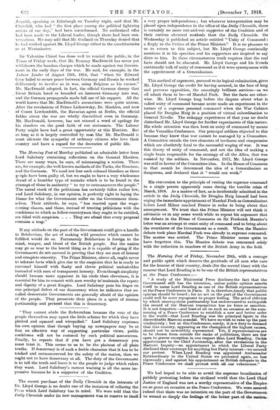This method of argument, pursued to its logical culmination, gives
Mr. Lloyd George the credit for having secured, in the face of long and perverse opposition, the amazingly brilliant services—as we all admit them to be—of Marshal Foch. But the facts are other- wise. Mr. Lloyd George long before the dispute about what is called unity of command became acute made an experiment in the nature of a supreme personal command when the War Cabinet placed Sir Douglas Haig in a position of virtual subordination to General Nivelle. The unhappy experiences of that year no doubt disinclined ,Mr. Lloyd George for further experiments of this-nature. His whole attention was then bent on unity of command by means of the Versailles Conference. Our principal soldiers objected to this because they knew that war cannot be managed by a Committee. A Committee entails the two elements of tardiness and compromise which are absolutely fatal to the successful waging of war. It was this theory of unity of command, and not the idea of making a single brain responsible for the- strategy. of all the Allies, that was reeisted by the soldiers. In November, 1917, Mr. Lloyd. George was still in favour of the Committee idea. In the House of Commons in that month he denounced the idea of a Generalissimo as dangerous, and declared that it " would. not work."










































 Previous page
Previous page